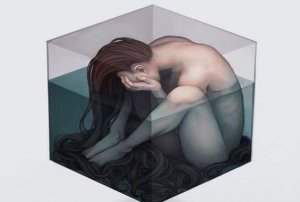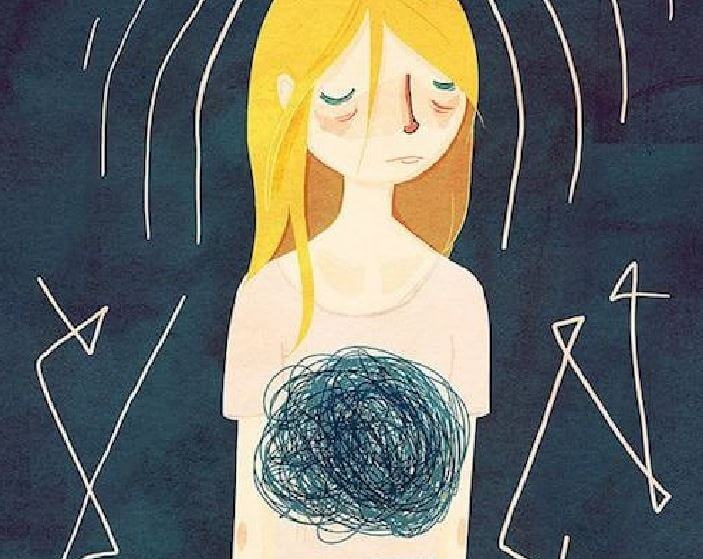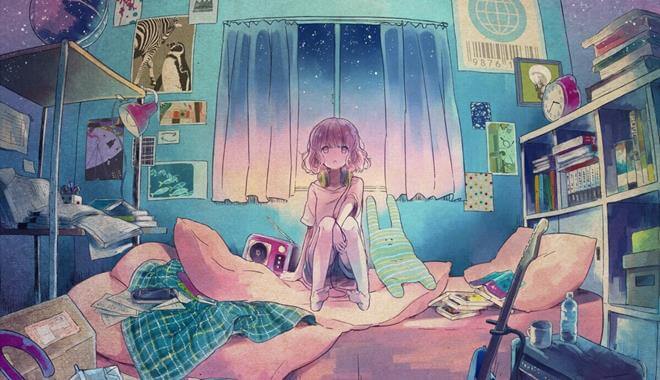Toxic Anxiety: The Keys to Recognizing It

Anxiety is a negative emotion that is not unhealthy in and of itself. However, when anxiety becomes chronic and unjustified, it turns into a painful and toxic emotion. One that can limit us greatly in our day to day lives.
At first anxiety is normal and healthy, because it helps us keep up a certain level of activity in order to protect ourselves from imminent dangers or to perform certain tasks.
Nevertheless, despite its protective nature, we fear its arrival simply because we’re scared for the anguish, worrying, nervousness, intense palpitations, sweating, etc. So we create a sort of vicious circle through which we feel anxiety when we predict it. That is to say, the same fear that the emotion itself generates gives way to the same sensations and the same reality that we’re so scared of.

The adrenaline and cortisol monster
This state, which we’re going to call “the vicious cycle of anxiety” is accompanied by the activity of two main hormones: adrenaline and cortisol. In order to understand how these hormones work, we can think about how we react when we trip while going down the stairs. Automatically, our heart skips a beat and we tend to reach out for the railing to save our physical integrity.
This set of sensations, which correspond to healthy anxiety, provide us with energy and strength in order to protect ourselves. These are moments of extreme and unpleasant excitement in which our body emits, out of pure necessity, a good amount of adrenaline and cortisol.
We could also think about a ride on a roller coaster, in which the sensations make it unpleasant and violent. Exactly the opposite of fun. This happens when we’re about to fall down the stairs or when we get on the roller coaster. We know that the sensations are temporary and that they’ll leave as quickly as they came.
However, when the dangers respond to expectations and thoughts that seek to predict future dangers, we don’t let the friendly monster of adrenaline sleep. And since we don’t let it sleep, the monster feeds off of our worries in the form of adrenaline. This hormone traps us more and more into these sensations of anguish, without having anything to justify it.
That is to say, that adrenaline and cortisol are left with nothing and no one to save from the dragon. They are just there, present, because we feed them with thoughts about the future that predict bad experiences.
So everything just gets trapped within us, despite how much it tries to escape and free itself. That’s why panic attacks happen, that’s why insomnia, negative thoughts and blocked off sensations perpetuate.

Masks that toxic anxiety uses to manifest itself
Chronic worrying
Anxiety can let itself be known through incessant worrying about one’s family, health, academic or professional goals, economic situation, etc. It’s likely that in the face of these worries, we’ll feel that our stomach is in a centrifuge and that something bad is going to happen, although we don’t know what or why.
Fears and phobias
An excessive fear of needles, blood, medical procedures, heights, elevators, the dentist, open water, animals like spiders or reptiles, dogs, storms, enclosed places, etc. This type of mask is another tough image that anxiety chooses to show you.
Performance anxiety
Sometimes anxiety paralyzes us during academic exams, while acting in a play, performing at a sporting competition or in any other situation that implies good performance in the execution of a plan.
Anxiety about public speaking
Disproportionate fear about public speaking is another of anxiety’s “favorite ways” to show itself. We feel like the world is spinning a thousand miles an hour. We tremble, seem nervous and believe that our minds will draw a blank and we’ll make a fool out of ourselves for the whole world to see.

Social phobia
Feeling nervous, tense and incapable of articulating a single word during social gatherings is another mask that anxiety uses to greet us. Things go through our head, such as “I have nothing interesting to say”, “I can’t talk to anyone”, “They are going to think that I’m weird and a failure”, “I’m not worth anyone’s interest or attention”, etc.
Panic attacks
Sweating, nausea, blackouts, rigidity, strong palpitations, intense fear… Have you felt this suddenly and thought you were going to die? If so, in this occasion anxiety took on a cruel disguise: a panic attack.
Agoraphobia
Are you scared of being outside of your home? Do you have the clear conviction that something horrible could happen to you on the street, in line at the supermarket or on public transportation? Do you feel like you are going to experience, for example, a panic attack and that no one will be able to help you? Anxiety has disguised itself as agoraphobia or, in other words, an intense fear of being in public spaces.
Obsessions and compulsions
There are thoughts that haunt you incessantly and which you can’t get out of your head. At the same time, something within you forces you to perform constant superstitious rituals in order to control your fears.
For example, you may feel the need to constantly wash your hands, to check that you have locked the door various times or to pray 10 Hail Marys to protect your family. Anxiety has disguised itself as obsessions and compulsions, one of its darkest outfits.

Post-traumatic stress disorder
Did you experience a traumatic event (sexual abuse, mistreatment, witnessing a murder, etc) months or even years ago and the images of that horrible situation still come back into your head over and over again? Do you lose sleep and feel unsafe because of it? Consult a mental health specialist, because anxiety might be manifesting itself as post-traumatic stress disorder.
Concern for physical appearance (body dysmorphic disorder)
Your physical appearance seems extremely abnormal, but only you can see what you’re feeling. Everyone else around you says “that it is not a big deal”, that your nose, body or hair are normal.
It’s likely that you feel the need to subject yourself to plastic surgery, and that you look at yourself constantly in the mirror with the intention of fixing your defects. Maybe anxiety is manifesting itself as a type of body dysmorphic disorder. Keep this in mind and seek out a mental health specialist to evaluate you.
Worrying about health (hypochondria)
Aches, fatigue, nausea, discomfort… You are sure that there is some disease that is crippling your health, but the doctor doesn’t se anything wrong with your test results. His explanations may not even calm you anymore.
It is possible that you have fallen victim to anxiety in the form of hypochondria. Therefore, in order to heal, seek out a good professional in the field of psychology to examine your beliefs and way of thinking about your health.
Notes to the reader
In no way should the content of this article be taken as a diagnosis. The idea is to bring the reader closer to the possibility that anxiety might be present in their mind, without them even realizing it. It is essential that in case of any suspicion, you should contact a mental health professional to evaluate and treat you if necessary.
Anxiety is a negative emotion that is not unhealthy in and of itself. However, when anxiety becomes chronic and unjustified, it turns into a painful and toxic emotion. One that can limit us greatly in our day to day lives.
At first anxiety is normal and healthy, because it helps us keep up a certain level of activity in order to protect ourselves from imminent dangers or to perform certain tasks.
Nevertheless, despite its protective nature, we fear its arrival simply because we’re scared for the anguish, worrying, nervousness, intense palpitations, sweating, etc. So we create a sort of vicious circle through which we feel anxiety when we predict it. That is to say, the same fear that the emotion itself generates gives way to the same sensations and the same reality that we’re so scared of.

The adrenaline and cortisol monster
This state, which we’re going to call “the vicious cycle of anxiety” is accompanied by the activity of two main hormones: adrenaline and cortisol. In order to understand how these hormones work, we can think about how we react when we trip while going down the stairs. Automatically, our heart skips a beat and we tend to reach out for the railing to save our physical integrity.
This set of sensations, which correspond to healthy anxiety, provide us with energy and strength in order to protect ourselves. These are moments of extreme and unpleasant excitement in which our body emits, out of pure necessity, a good amount of adrenaline and cortisol.
We could also think about a ride on a roller coaster, in which the sensations make it unpleasant and violent. Exactly the opposite of fun. This happens when we’re about to fall down the stairs or when we get on the roller coaster. We know that the sensations are temporary and that they’ll leave as quickly as they came.
However, when the dangers respond to expectations and thoughts that seek to predict future dangers, we don’t let the friendly monster of adrenaline sleep. And since we don’t let it sleep, the monster feeds off of our worries in the form of adrenaline. This hormone traps us more and more into these sensations of anguish, without having anything to justify it.
That is to say, that adrenaline and cortisol are left with nothing and no one to save from the dragon. They are just there, present, because we feed them with thoughts about the future that predict bad experiences.
So everything just gets trapped within us, despite how much it tries to escape and free itself. That’s why panic attacks happen, that’s why insomnia, negative thoughts and blocked off sensations perpetuate.

Masks that toxic anxiety uses to manifest itself
Chronic worrying
Anxiety can let itself be known through incessant worrying about one’s family, health, academic or professional goals, economic situation, etc. It’s likely that in the face of these worries, we’ll feel that our stomach is in a centrifuge and that something bad is going to happen, although we don’t know what or why.
Fears and phobias
An excessive fear of needles, blood, medical procedures, heights, elevators, the dentist, open water, animals like spiders or reptiles, dogs, storms, enclosed places, etc. This type of mask is another tough image that anxiety chooses to show you.
Performance anxiety
Sometimes anxiety paralyzes us during academic exams, while acting in a play, performing at a sporting competition or in any other situation that implies good performance in the execution of a plan.
Anxiety about public speaking
Disproportionate fear about public speaking is another of anxiety’s “favorite ways” to show itself. We feel like the world is spinning a thousand miles an hour. We tremble, seem nervous and believe that our minds will draw a blank and we’ll make a fool out of ourselves for the whole world to see.

Social phobia
Feeling nervous, tense and incapable of articulating a single word during social gatherings is another mask that anxiety uses to greet us. Things go through our head, such as “I have nothing interesting to say”, “I can’t talk to anyone”, “They are going to think that I’m weird and a failure”, “I’m not worth anyone’s interest or attention”, etc.
Panic attacks
Sweating, nausea, blackouts, rigidity, strong palpitations, intense fear… Have you felt this suddenly and thought you were going to die? If so, in this occasion anxiety took on a cruel disguise: a panic attack.
Agoraphobia
Are you scared of being outside of your home? Do you have the clear conviction that something horrible could happen to you on the street, in line at the supermarket or on public transportation? Do you feel like you are going to experience, for example, a panic attack and that no one will be able to help you? Anxiety has disguised itself as agoraphobia or, in other words, an intense fear of being in public spaces.
Obsessions and compulsions
There are thoughts that haunt you incessantly and which you can’t get out of your head. At the same time, something within you forces you to perform constant superstitious rituals in order to control your fears.
For example, you may feel the need to constantly wash your hands, to check that you have locked the door various times or to pray 10 Hail Marys to protect your family. Anxiety has disguised itself as obsessions and compulsions, one of its darkest outfits.

Post-traumatic stress disorder
Did you experience a traumatic event (sexual abuse, mistreatment, witnessing a murder, etc) months or even years ago and the images of that horrible situation still come back into your head over and over again? Do you lose sleep and feel unsafe because of it? Consult a mental health specialist, because anxiety might be manifesting itself as post-traumatic stress disorder.
Concern for physical appearance (body dysmorphic disorder)
Your physical appearance seems extremely abnormal, but only you can see what you’re feeling. Everyone else around you says “that it is not a big deal”, that your nose, body or hair are normal.
It’s likely that you feel the need to subject yourself to plastic surgery, and that you look at yourself constantly in the mirror with the intention of fixing your defects. Maybe anxiety is manifesting itself as a type of body dysmorphic disorder. Keep this in mind and seek out a mental health specialist to evaluate you.
Worrying about health (hypochondria)
Aches, fatigue, nausea, discomfort… You are sure that there is some disease that is crippling your health, but the doctor doesn’t se anything wrong with your test results. His explanations may not even calm you anymore.
It is possible that you have fallen victim to anxiety in the form of hypochondria. Therefore, in order to heal, seek out a good professional in the field of psychology to examine your beliefs and way of thinking about your health.
Notes to the reader
In no way should the content of this article be taken as a diagnosis. The idea is to bring the reader closer to the possibility that anxiety might be present in their mind, without them even realizing it. It is essential that in case of any suspicion, you should contact a mental health professional to evaluate and treat you if necessary.
This text is provided for informational purposes only and does not replace consultation with a professional. If in doubt, consult your specialist.







